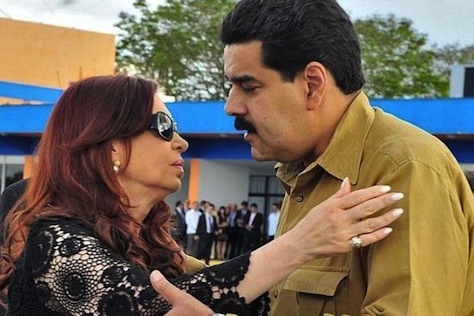
In a set of free and fair elections, it would not be difficult to predict that Venezuela’s long-suffering opposition would win a wide majority in December 6’s legislative elections; for many Venezuelans, despite marked disadvantages, the question is not whether the opposition will win, but by how much.![]()
That doesn’t mean the anti-chavista coalition Mesa de la Unidad Democrática (MUD, Democratic Unity Roundtable) is anywhere near taking real power in Venezuela. No matter what happens, on December 7, Venezuelans will still wake up to president Nicolás Maduro, the oft-ridiculed successor to the late Hugo Chávez. Maduro only narrowly won the presidency in April 2013, following Chávez’s death, and Venezuela’s economy, already in dire trouble two years ago, has failed dramatically ever since.
What’s more, short of a massive supermajority, Venezuela will be gridlocked for the next three years when the next presidential election will held, at a time when its economy has reached crisis-level proportions of failure.
Dependence on oil revenues meant that even before global oil prices plummeted, Venezuelans were facing shortages of basic products, from food to medical supplies to toilet paper, and inevitable scenes of government-mandated rationing. Massive inflation, in tandem with an unofficially depreciating currency, has inflicted even greater economic pain for a country dependent on foreign imports, at least for those without access to US dollars. The economy is expected to contract by as much as 10% in a single year, making Venezuela’s the worst-performing in the world in 2015. Earlier this spring, conditions were so bad that chavista supporters took to throwing mangoes at Maduro at political events in desperate search of basic necessities. Maduro, meanwhile, has campaigned hard on Chávez’s memory and fear tactics that the opposition will reverse the government’s many social welfare programs.
Voters will be choosing all 167 members of the Asamblea Nacional (National Assembly), where the chavistas currently hold 99 seats, while the opposition coalition holds just 64. Yet few observers believe that the Partido Socialista Unido de Venezuela (PSUV, United Socialist Party of Venezuela), the chavista party that for 16 years has governed the country in a way that’s blurred the line between political and governance activity, can win a majority in the elections. Datanálisis, one of Venezuela’s most respected polls, pitted the opposition coalition’s support at over 63%, with just 28% support for the chavistas in an October poll. Over at Caracas Chronicles, Francisco Toro argues that, for the first time in years, the December 6 elections represent the re-introduction of ‘politics’ to Venezuelan life.
But for a country where chavismo has now become so entrenched in its government and commerce, no one knows for sure exactly what the MUD’s margin of victory might be and how many seats it will ultimately procure. Under the dual voting system, most members are elected in single-seat districts, while 30% are elected by closed-list proportional representation. Rural areas, where the poorest voters support Maduro and chavismo more strongly for the generous social welfare programs introduced since 1999, are over-represented, as compared to urban areas, where the opposition’s support is strongest. A simply majority will give the opposition less power than a three-fifths majority or a two-thirds majority, with which the MUD could even forced a recall referendum against Maduro. Continue reading No matter who wins, Sunday’s elections will not be chavismo’s last stand
